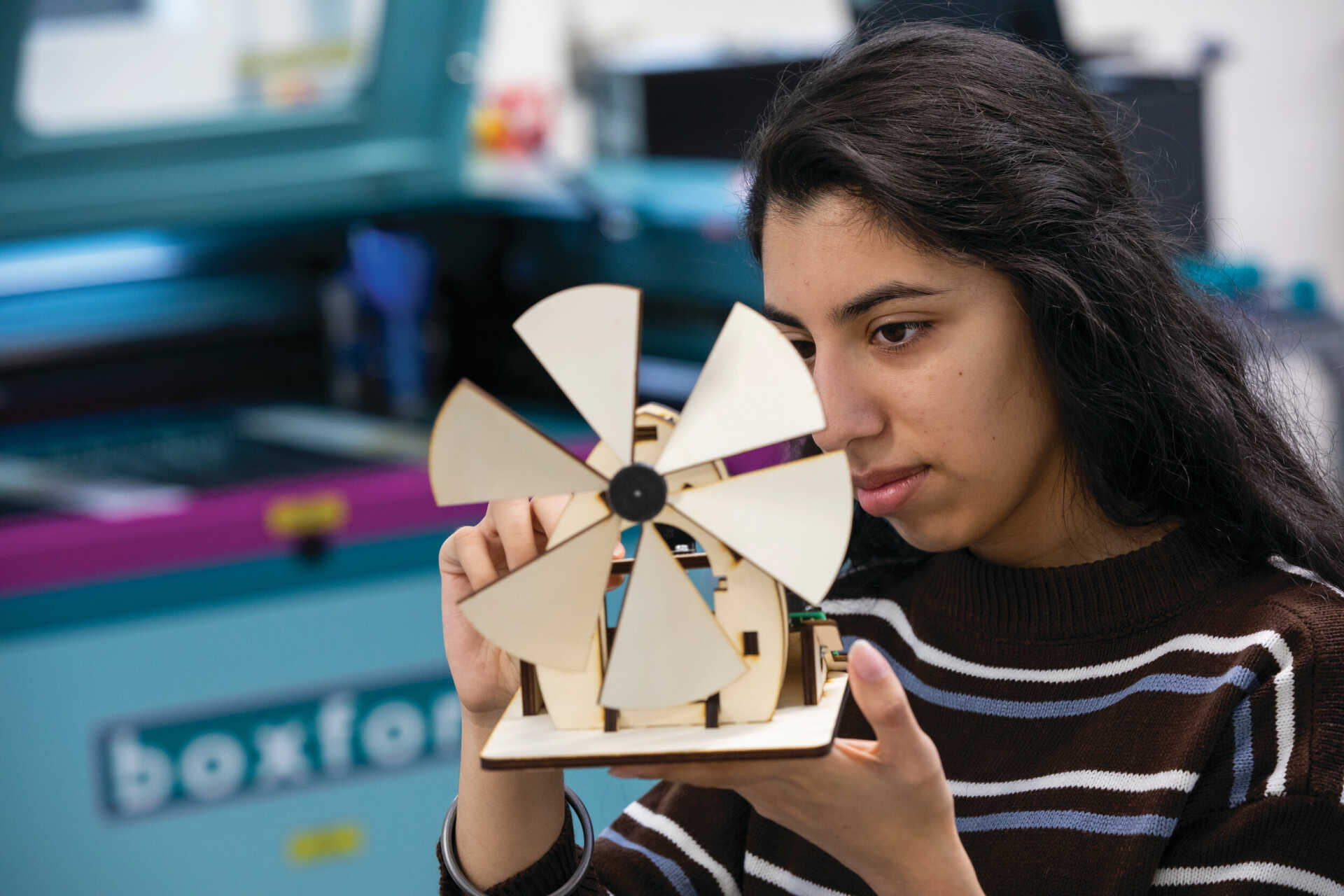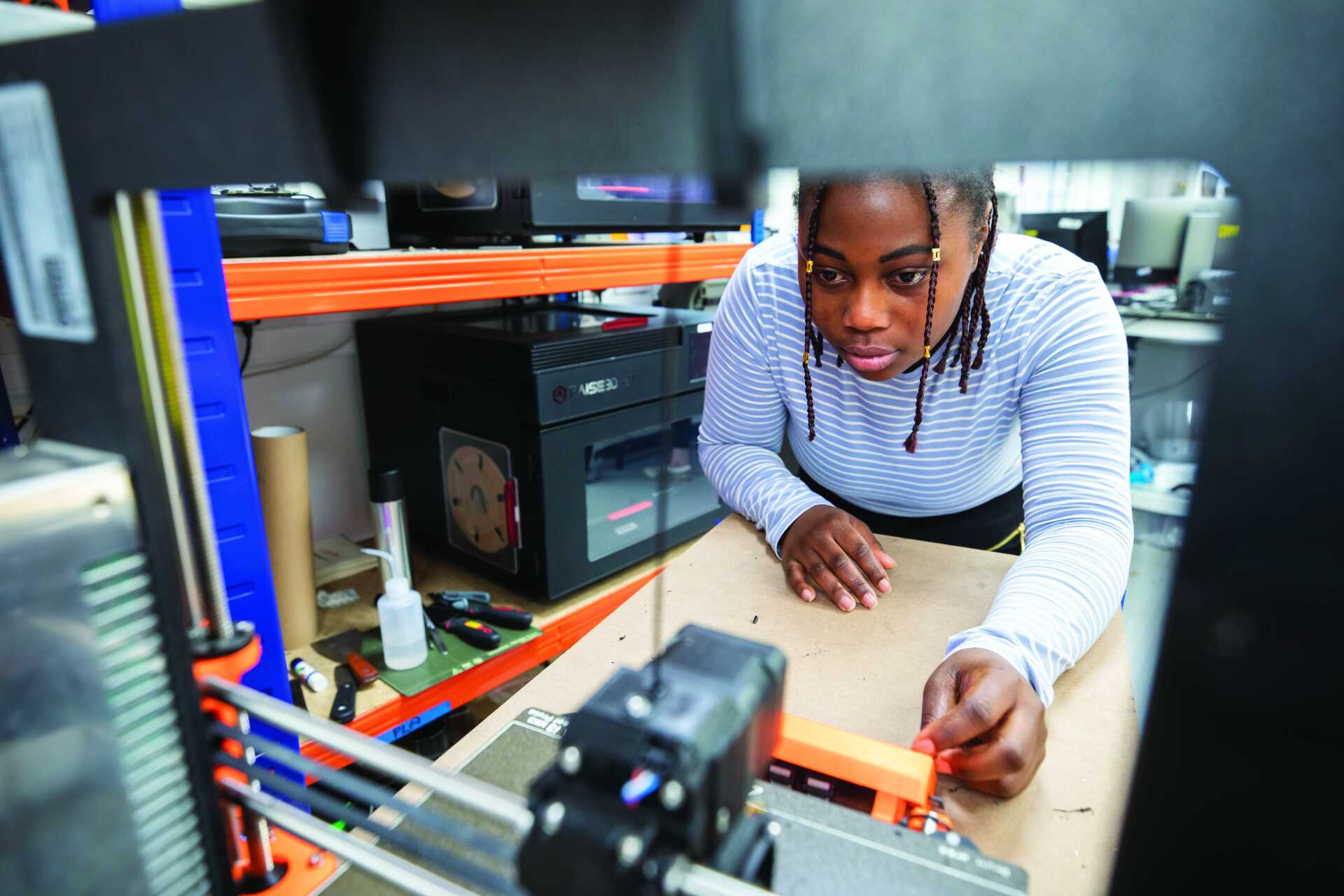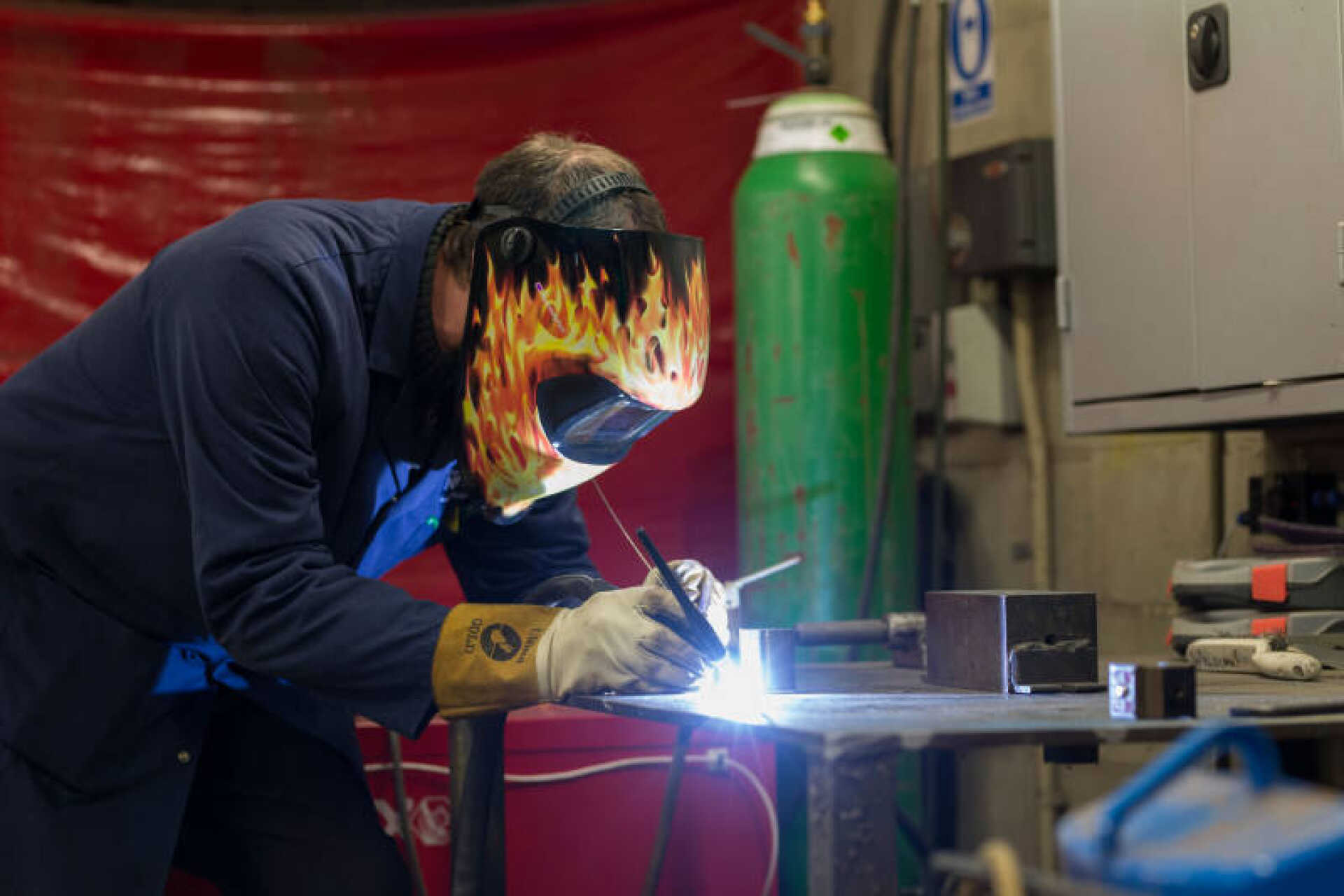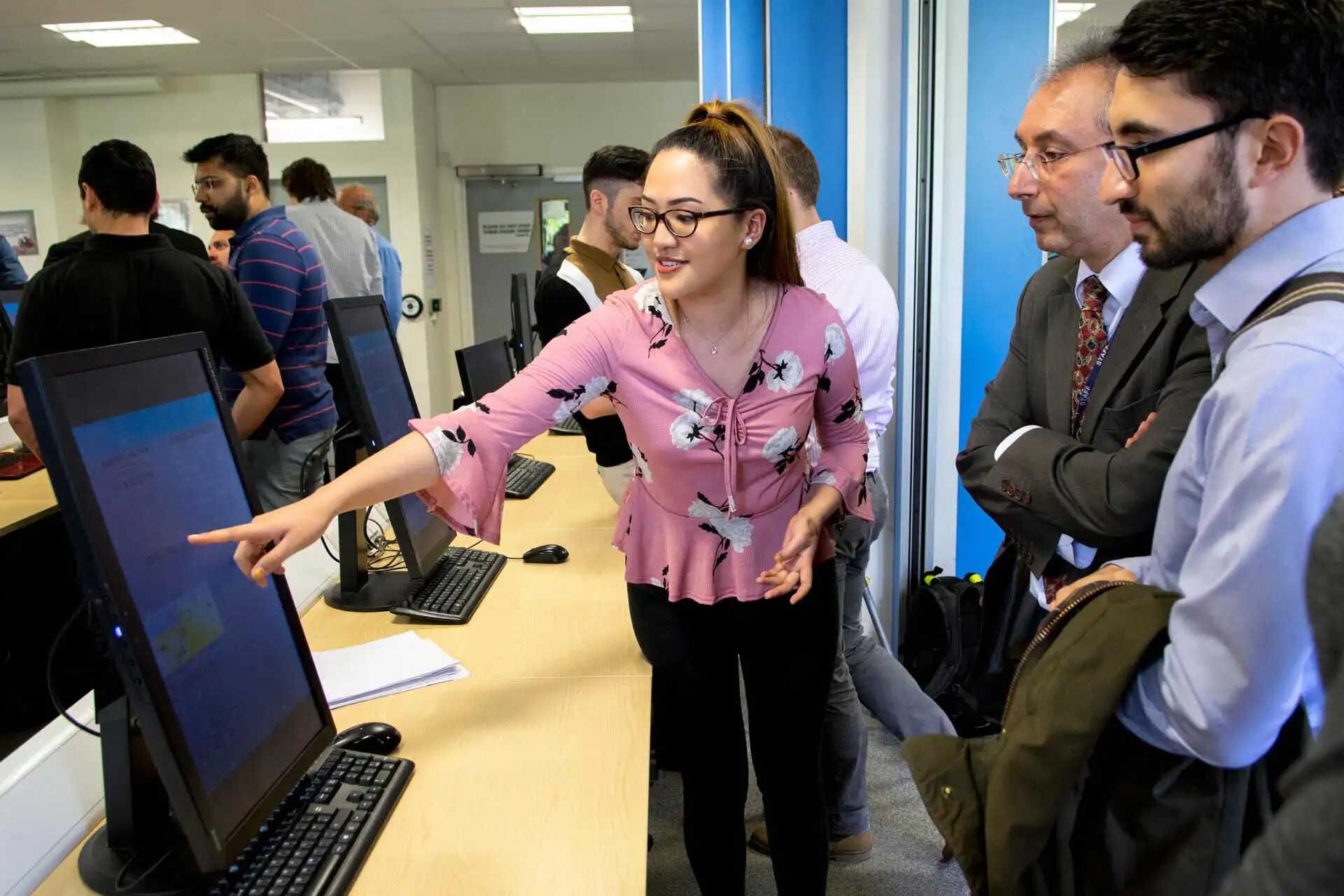Mechanical Engineering
with a Year in Industry
Gain skills to build the product of the future.

Gain skills to build the product of the future.
Think you've found the right course? We still have spots available through Clearing. Apply now to secure your place and join our dynamic and welcoming community at Kent this September.
Apply nowEngineering has shaped modern society and personal lives in a way that no other discipline has. By studying Mechanical Engineering at Kent you gain the skills to make your own mark in this exciting field. Graduates can work at the forefront of the major areas of mechanical engineering, combining theory with practical and project work, turning ideas into real systems. Will you build the product of the future?
At Kent, you study all aspects of mechanical engineering, from 3D design to advanced manufacturing, control and mechatronic to advanced robotics and fluid dynamics to thermodynamic and heat transfer, preparing you for a career in any branch of mechanical engineering.
The Year in Industry opportunity develops your technical skills, employability and soft skills as well as increasing your awareness of the future context for employment.
Your Year in Industry takes place between your second and final year. The School’s dedicated employability officer helps you to identify organisations offering placements. Companies also visit the School to present their industrial placement opportunities and to interview candidates.
As well as gaining invaluable workplace experience, you stand a good chance of being offered a job by that employer after graduation.

Experience the future of technology with robotics, AI, mechatronics, fluid dynamics and more.
Strong links with the Royal Academy of Engineering and the Institution of Mechanical Engineers (IMechE)

First-class facilities to support your development with access to computer labs, mechanical workshop, engineering lab, anechoic chamber and more.
Tailor the course to match your interests and future career plans.

Take a placement year to help boost your professional skills and get paid to do it.
Our typical offer levels are listed below and include indicative contextual offers. If you hold alternative qualifications just get in touch and we'll be glad to discuss these with you.
At Kent, you’re more than your grades. We look at each student’s circumstances as a whole before deciding whether to make an offer to study here. We also take this flexible approach when we receive your exam results. Some courses may prefer your qualifications to include specific subjects, which will be listed below if required.
Check our Clearing vacancy list or call us now +44 (0)1227 768896 to find out if we have a course that’s right for you. See our Clearing website for more details on how Clearing works at Kent.
The following modules are offered to our current students. This listing is based on the current curriculum and may change year to year in response to new curriculum developments and innovation:
The following modules are indicative of those offered on this programme. This listing is based on the current curriculum and may change year to year in response to new curriculum developments and innovation.
On most programmes, you study a combination of compulsory and optional modules. You may also be able to take ‘elective’ modules from other programmes so you can customise your programme and explore other subjects that interest you.
EENG0021 - Calculus (15 credits)
EENG0024 - Electromagnetics for Engineers (15 credits)
EENG0025 - Engineering Principles – 1 (15 credits)
EENG0026 - Engineering Principles – 2 (15 credits)
EENG0027 - Engineering Principles – 3 (15 credits)
EENG0033 - Engineering and Programming Skills (15 credits)
MAST0022 - Graphs, Geometry and Trigonometry (15 credits)
PHYS0020 - Algebra and Arithmetic (15 credits)
Compulsory modules currently include:
EENG3230 - Engineering Design and Mechanics (15 credits)
EENG3240 - Fundamentals and Mechanics of Materials (15 credits)
EENG3050 - Introduction to Electronics (15 credits)
EENG3110 - First Year Engineering Applications Project (15 credits)
EENG3130 - Introduction to Programming (15 credits)
EENG3150 - Digital Technologies (15 credits)
EENG3180 - Engineering Mathematics (15 credits)
EENG3190 - Engineering Analysis (15 credits)
Compulsory modules currently include:
EENG5170 - Control and Mechatronics (15 credits)
EENG5620 - Engineering Group Project (15 credits)
EENG5650 - Instrumentation and Measurement Systems (15 credits)
EENG5180 - Dynamics of Machines (15 credits)
EENG5190 - Introduction to Fluid Dynamics (15 credits)
EENG5200 - Failure of Materials and Structures (15 credits)
EENG5770 - Entrepreneurship and Professional Development (15 credits)
EENG5220 - Design and Manufacturing Technology (15 credits)
You spend a year working in industry between Stages 2 and 3. You gain practical work experience, while assessing possible future career options and making contacts in the industry. Employers are always keen to employ graduates with knowledge of the work environment and some students receive job offers from their placement company.
We have a dedicated Employability Officer who will help you apply for placements; but please note that it is your responsibility to secure a placement, which cannot always be guaranteed. The School has excellent industrial links, providing students with many placement opportunities.
You are eligible to apply for a placement offered through the School's exchange agreement with Hong Kong City University.
Please note that progression thresholds apply. In particular, in order to be considered for an industrial placement, you need to achieve an overall mark at Stage 1 of at least 60%.
Compulsory modules currently include:
EENG7910 - Year in Industry (Industrial Assessment) (90 credits)
EENG7920 - Year in Industry (Academic Assessment) (30 credits)
Compulsory modules currently include:
EENG6000 - Project (45 credits)
EENG6460 - Robotics and Artificial Intelligence (15 credits)
EENG6830 - Reliability, Availability, Maintainability and Safety (RAMS) (15 credits)
EENG6470 - Finite Element Analysis (15 credits)
EENG6480 - Engineering Thermodynamics and Heat Transfer (15 credits)
Optional modules:
Teaching includes practical work in conventional laboratory experiments or projects, lecture modules and examples classes, which develop your problem-solving skills, and staff hold regular ‘surgeries’ where you can discuss any questions you have. Practical work is carried out in air-conditioned laboratories, with state-of-the-art equipment and outstanding IT infrastructure.
Stage 1 modules are assessed by coursework and examination at the end of the year. Stage 2 and 3 modules, with the exception of the Stage 3 project, are assessed by a combination of coursework and examination. All years include project work to replicate industrial practice and develop skills to maximise employability.
For a student studying full time, each academic year of the programme will comprise 1200 learning hours which include both direct contact hours and private study hours. The precise breakdown of hours will be subject dependent and will vary according to modules.
Methods of assessment will vary according to subject specialism and individual modules.
Please refer to the individual module details under Course Structure.
For programme aims and learning outcomes please see the programme specification.
You'll be set up for a great career after Kent, with graduates going on to work in areas including aerospace and automotive industries, the armed forces and the Ministry of Defence, construction and building services, energy utilities, government agencies and so many more.
The School of Engineering holds an annual Employability and Careers Day where you can meet local and national employers and discuss career opportunities. Ongoing support is provided by the School’s dedicated Employability Officer.

The 2024/25 annual tuition fees for this course are:
For details of when and how to pay fees and charges, please see our Student Finance Guide.
For students continuing on this programme, fees will increase year on year by no more than RPI + 3% in each academic year of study except where regulated.*
The University will assess your fee status as part of the application process. If you are uncertain about your fee status you may wish to seek advice from UKCISA before applying.
Find out more about accommodation and living costs, plus general additional costs that you may pay when studying at Kent.
Kent offers generous financial support schemes to assist eligible undergraduate students during their studies. See our funding page for more details.
You may be eligible for government finance to help pay for the costs of studying. See the Government's student finance website.
Scholarships are available for excellence in academic performance, sport and music and are awarded on merit. For further information on the range of awards available and to make an application see our scholarships website.

We have a range of subject-specific awards and scholarships for academic, sporting and musical achievement.
Student Life

In the QS World University Rankings 2024, Kent has been ranked 39th within the UK and is in the top 25% of Higher Education Institutions worldwide.
Kent Sport
Kent has risen 11 places in THE’s REF 2021 ranking, confirming us as a leading research university.

An unmissable part of your student experience.